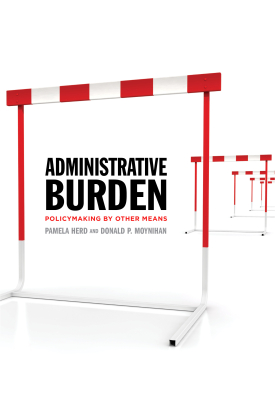Winner of the 2022 Herbert Simon Best Book Award Presented by the Public Administration Section of the American Political Science Association
Winner of the 2020 Outstanding Book Award Presented by the Public and Nonprofit Section of the National Academy of Management
Winner of the 2019 Louis Brownlow Book Award from the National Academy of Public Administration
“By putting a spotlight on the consequences of administrative burdens, Herd and Moynihan have done a great public service.” New York Review of Books
“Our confidence in government as a force for the public good is at stake. Read this book and see why.” Journal of Policy Analysis and Management
“Herd and Moynihan perform an excellent service for Americans who are being short-changed in terms of taxes they have paid, rights they are constitutionally guaranteed and opportunities that sadly may never materialize.” The Innovation Journal
“(A) brilliantly written and thought-provoking book that should be situated in the context of the general debate over the scope of social policy in democratic societies.” Journal of Public Administration Research and Theory
“(A) landmark study explaining how administrative burdens impact outcomes associated with U.S. policymaking. This volume will influence a wide swath of students in the related fields of public administration and public policy.” P.S. Perspectives on Politics
“Exactly what a conceptual frame-work should be: usable…will surely become required reading for public management scholars and students alike due to its clear framework and policy breadth.” Governance
“(F)ascinating…a systematic account of “policy by other means” that must be heeded by policy makers and social scientists alike. They provide a reckoning of an often ignored, but critical, dimension of policy implementation as a political venue.” Journal of Politics
“Herd and Moynihan’s collective voice provides inspiration by emphasizing that an evolved approach to good government through burden reduction could have significant positive impact on individual lives…essential reading for public policy students and practitioners.” Political Science Quarterly
“(A)n exceptional text that comes at an exceptional time in our nation’s history. If used properly, it may be an exceptional instrument for the preparation of scholars and practitioners desiring to produce a just and efficient government.” Journal of Public Affairs Education
“A path-breaking framework for deeper study of policy making, implementation, and evaluation that has the potential to add contextual depth and analytical rigor to our conceptions of government action.” Public Administration Review
“Citizens routinely experience government in their everyday lives, and too often such encounters impose cumbersome challenges and reinforce inequality. In this clearly written and power fully argued book, Pamela Herd and Donald P. Moynihan argue that these ‘administrative burdens’ are political tactics, strategically applied to policies by political leaders who aim to restrict access to rights and benefits. Change is possible, however, as demonstrated by policies in which more effective and efficient procedures have been adopted. This captivating and important book is a ‘must read’ for anyone who wants to see government operate better in serving citizens.”
—SUZANNE METTLER, John L. Senior Professor of American Institutions, Cornell University
“In ways variable and systemic, citizens shoulder burdens of the everyday operations of government. This fundamental truth of modern public administration has never received the attention it merits. Until now. With cutting-edge conceptual formation, mixed methodological lenses, and uncommon rigor, Pamela Herd and Donald P. Moynihan have authored an instant classic on a problem of vast proportions, one that will be setting research agendas for decades to come.”
—DANIEL CARPENTER, Allie S. Freed Professor of Government, Harvard University
Bureaucracy, confusing paperwork, and complex regulations—or what public policy scholars Pamela Herd and Donald Moynihan call administrative burdens—often introduce delay and frustration into our experiences with government agencies. Administrative burdens diminish the effectiveness of public programs and can even block individuals from fundamental rights like voting. In Administrative Burden, Herd and Moynihan document that the administrative burdens citizens regularly encounter in their interactions with the state are not simply unintended byproducts of governance, but the result of deliberate policy choices. Because burdens affect people’s perceptions of government and often perpetuate long-standing inequalities, understanding why administrative burdens exist and how they can be reduced is essential for maintaining a healthy public sector.
Through in-depth case studies of federal programs and controversial legislation, the authors show that administrative burdens are the nuts-and-bolts of policy design. Regarding controversial issues such as voter enfranchisement or abortion rights, lawmakers often use administrative burdens to limit access to rights or services they oppose. For instance, legislators have implemented administrative burdens such as complicated registration requirements and strict voter-identification laws to suppress turnout of African American voters. Similarly, the right to an abortion is legally protected, but many states require women seeking abortions to comply with burdens such as mandatory waiting periods, ultrasounds, and scripted counseling. As Herd and Moynihan demonstrate, administrative burdens often disproportionately affect the disadvantaged who lack the resources to deal with the financial and psychological costs of navigating these obstacles.
However, policymakers have sometimes reduced administrative burdens or shifted them away from citizens and onto the government. One example is Social Security, which early administrators of the program implemented in the 1930s with the goal of minimizing burdens for beneficiaries. As a result, the take-up rate is about 100 percent because the Social Security Administration keeps track of peoples’ earnings for them, automatically calculates benefits and eligibility, and simply requires an easy online enrollment or visiting one of 1,200 field offices. Making more programs and public services operate this efficiently, the authors argue, requires adoption of a nonpartisan, evidence-based metric for determining when and how to institute administrative burdens, with a bias toward reducing them. By ensuring that the public’s interaction with government is no more onerous than it need be, policymakers and administrators can reduce inequality, boost civic engagement, and build an efficient state that works for all citizens.
PAMELA HERD is a professor in the McCourt School of Public Policy at Georgetown University.
DONALD MOYNIHAN is the inaugural McCourt Chair in the McCourt School of Public Policy at Georgetown University.

